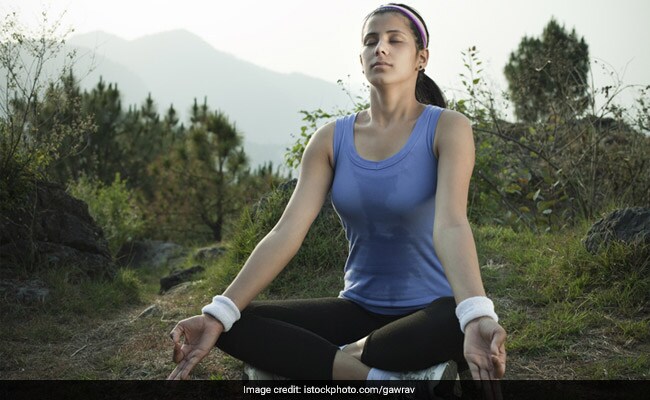
The lockdown has been extended till May 3. This is not the time to panic, feel stressed or anxious about the situation. In fact, this is the time to stay positive and motivated, and take all possible prevention steps for coronavirus. Yoga and meditation can be helpful in this case. Being at home for practicing social distancing leaves you with some extra time in your schedule, and this time can be dedicated to your own wellness. Doing so can be especially helpful for people who feel chronically stressed, are going through depression and even health conditions like high blood pressure.
Mental health tips: Yoga asanas for stress, anxiety and high blood pressure
Celebrity nutritionist Rujuta Diwekar, in one of her posts on Instagram, shares three asanas that can help in offering relief from stress, anxiety and high blood pressure. A chair, blanket, bolster, dupatta or belt are some simple yet essential prerequisites for it.
Also read: Lockdown Extended: Diet And Workout Tips To Maintain Your Fitness And Avoid Gaining Weight
1. Uttanasana (Standing forward bends) with variations
Diwekar introduces a few variations to standing forward bends. Stand facing the chair (as it is illustrated in the video), make sure your weight is equally distributed on both feet. Bend forwards so that your hips go upwards and your navel come towards the chest. Rest your fingers on the chair. Open your chest and stay in the position for a few seconds. Then put your fingers out (opposite to each other) and stay, and then put your fingers facing each other and stay, and finally put your fingers backwards and stay. Make sure your chest is open in all three positions. Stay in each position for at least 30 seconds, Diwekar recommends.
This asana can be beneficial for people with high blood pressure. Also when you put your head down, make sure that your forehead is pushed downwards and not upwards. If you are unable to bend your knee, then you can do this asana with your leg extended outwards.

Standing forward bends can be beneficial for people with high blood pressure
Photo Credit: iStock
Also read: Surya Namaskar Variations: Try These For Better Stamina, Endurance And Flexibility
2. Janusirsasana (Head to knee forward bend)
Sit on the mat and extend your feet in the front. Your feet should be spread and your hips should touch the mat. Bend your right knee and bring it closer to yourself. Now twist your upper body towards left and try to touch your thigh with your stomach. You can keep a bolster on your thigh and keep your head on it. You can also put one or more blanket over the bolster if you are able to reach it comfortably. You can also pull the chair and place your head on it if that's more comfortable. Watch video to see how Diwekar does it.
3. Vipareet Karni (Legs up the wall)
This asana can help in reducing back pain and varicose veins. It can really help you relax as well. This asana can also be helpful for those who get painful periods. To perform this asana, you need to put the bolster at the wall. Sit on the bolster and lift your legs up as they rest on the wall. Lie down and try to relax and stay in this position. This asana can help you relax and aid faster recovery. You can also bend your kneeds for a while if keeping your feet up straight is difficult.
If that is also difficult, then rest your legs on the chair. Keep a gap between knees if you find it difficult. You can also opt for stacking a few pillows on the chair to make the asana easy and doable for you.

Regular practice of yoga can help in reducing stress and anxiety
Photo Credit: iStock
(Rujuta Diwekar is a nutritionist based in Mumbai)
Disclaimer: This content including advice provides generic information only. It is in no way a substitute for qualified medical opinion. Always consult a specialist or your own doctor for more information. NDTV does not claim responsibility for this information.
Track Latest News Live on NDTV.com and get news updates from India and around the world

